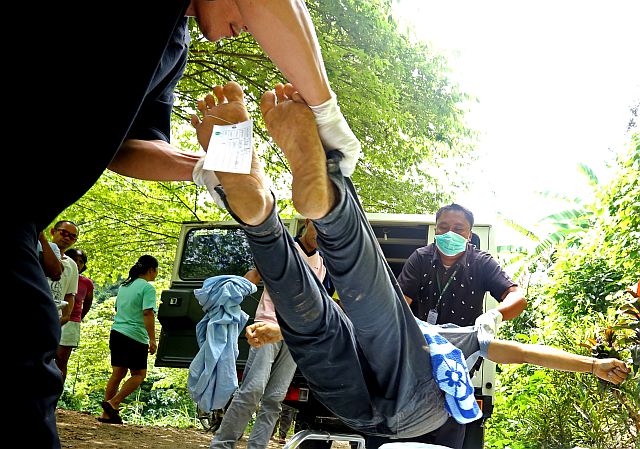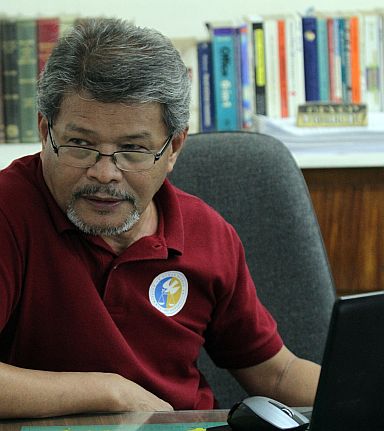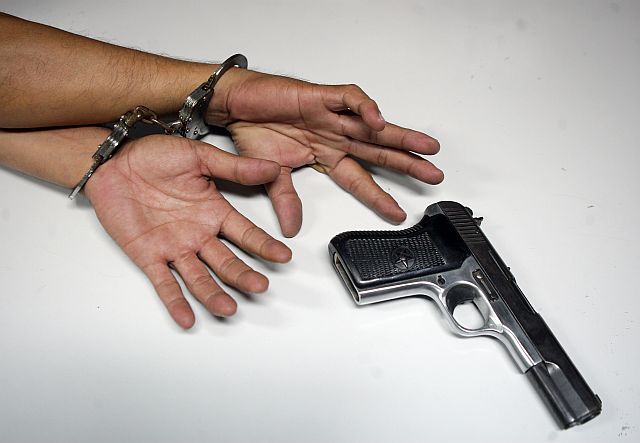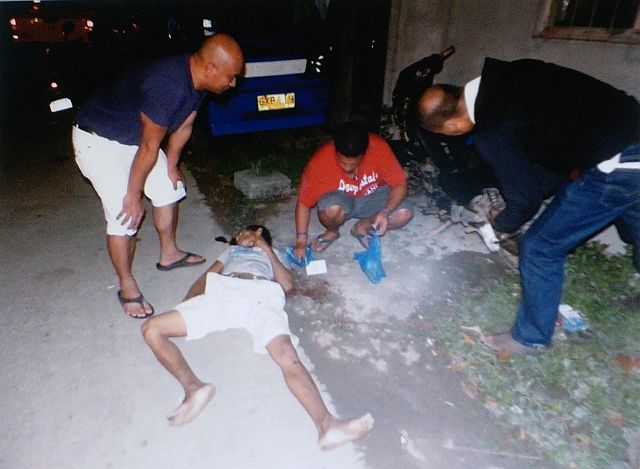
Funeral parlor attendants carry the body of Ed Borces, a suspected drug dealer who was shot and killed by Talamban police who raided his house in Sitio San Jose, Barangay Talamban in Cebu City. (CDN PHOTO/LITO TECSON).
(A special CDN series on the Philippine National Police and the war on illegal drugs in Central Visayas)
Forty-one-year-old Julian Ramos, a carpenter from Barangay Mabolo, Cebu City, admitted to using shabu (meth amphetamine hydrochloride) since he was a teenager.
Fearing for his life, he decided to join groups of drug dependents who surrendered to the police at the start of “Oplan Tokhang” (Toktok-Hangyo), a government anti-drug campaign where law enforcers knock on the doors of suspected drug personalities to ask them to turn their backs on illegal drugs.
His live-in partner, Marivic Gaudiano, was happy, thinking that Julian was on his way to changing his life and would no longer become a target of police operations.
Their journey together was smooth until four months after when Marivic got the shock of her life.
Julian was shot by an unknown assailant while playing chess by the roadside near their home last Nov. 17.
He managed to run a few steps toward their house, but the gunman kept up with him and finished him off.
Julian suffered multiple gunshot wounds on his body. He was rushed to the Cebu City Medical Center but was declared dead on arrival.
The gunman fled through a motorcycle driven by another man. Both suspects did not wear a mask to hide their identity, but not one of Julian’s neighbors recognized the suspects.
All Marivic could do was to mourn her partner’s death.
“Shock pa ko. Wala ko nag-expect nga mahitabo to niya. (I’m still in shock. I did not expect that he would be killed),” the 24-year-old woman said.
Julian left three children.
According to police, Julian was not only a drug user but was also peddling illegal drugs.
Ruben Tamayo, a tanod of Barangay Mabolo, said the victim was on their drugs watch list.
Marivic appeals for justice but knows that this would not come easy.
“Sa kadaghang extrajudicial killings, naa ba guy natagad bisan usa? Kami na lang gyud ang tagdon? (Of the number of extrajudicial killings, is there even one that government seriously paid attention to? Why would they even bother to help us)?” she told CDN.
The body count
At least 172 cases that bore marks of extrajudicial killings of drug suspects are now being investigated by the Commission on Human Rights in Central Visayas (CHR-7).
But Leo Villarino, CHR-7 chief investigator, admitted that killings involving unknown assailants are tough to solve.
“It’s really hard. Cases like this take a back seat in our investigation because we don’t have any starting point unless a witness comes forward to identify the assailants,” he told CDN.
“For now, we are groping in the dark. We just can’t identify the perpetrators. But we, nonetheless, continue investigating,” he added.
Last July 15, CHR-7 received a directive from lawyer Diana De Leon of the commission’s Human Rights Protection Office in Manila, mandating the regional office to conduct an investigation on what could be cases of summary executions.
Most of the cases investigated by the commission involved policemen.
So far, Villarino said 40 policemen in Central Visayas were required by CHR to submit their reports on police operations that were linked to extrajudicial killings.
In one case, CHR-7 assisted the family of a drug suspect in filing a murder complaint against a member of the Special Weapons and Tactics and another policeman before the Office of the Ombudsman in the Visayas.

VILLARINO
Villarino said that the drug-related killings since President Rodrigo Duterte was elected have been “alarming.”
“Before, drug suspects were killed solely in police operations. But now, deaths involving unknown assailants are rising. And we’re not seeing any decline in the killings. The only adjective to describe it is alarming,” he said.
Senate probe
Early December, a joint report of the Senate committees on justice and human rights, and public order and dangerous drugs said the government had nothing to do with the rising body count in the war against illegal drugs.
Eleven of 16 senators who looked into the series of deaths have signed a joint committee report which found no proof that the killings in the country were state-sponsored.
The same report also found no sufficient evidence to prove the existence of a Davao Death Squad which is being blamed for the killing of more than 1,000 suspected criminals since 1988 when Duterte was still the mayor of the city.
“However, the committee took note of the many thousands of killings with impunity taking place every year in the last two decades at least,” read the 19-page executive summary of the report of the joint committees on justice and human rights chaired by Senator Richard Gordon, and the committee on public order and dangerous drugs chaired by Senator Panfilo Lacson.
The Senate probe was initiated by Senator Leila de Lima, who previously headed the Senate justice committee until she was ousted and replaced by Gordon.
Villarino, a CHR-7 investigator since 1988, disagreed with the Senate findings.
“I’m not attributing the spate of killings to the President. But I’m just stating the fact that after President Duterte took his oath, there appears to be rising incidents of drug-related killings involving unknown assailants. The figures will bear this out,” Villarino stressed.
He said law enforcement units should do their best to address the problem; otherwise, people will think that the government was behind it.
“The failure of law enforcement agencies to investigate cases of alleged extrajudicial killings, either by tolerance or inaction, means they should be responsible for the killings,” Villarino said.

Drugs killing EJK. (TD)
Villarino appealed to the Duterte administration to be serious in conducting investigations of alleged extrajudicial cases if they truly have nothing to do with the killings.
“To those who support the series of killings, let me ask you: up to what point or up to how many do you say that it’s already alarming? One thousand, two, three, four thousand or a million deaths?” he asked.
“Every day we are counting numbers on how many are dead. We can never find a day when no one gets killed. That makes it alarming,” he added.
Villarino also appealed to victims of extrajudicial killings, especially those killed by unknown assailants, not to lose hope in their quest for justice.
“I know they feel hopeless. We could say that those killed in police operations have a greater chance of securing justice compared to those killed by unknown assailants,” he said.
“In police operations, at least we know who to investigate. In cases where the assailants are unknown, we keep on guessing and we’re left without any evidence,” he added.
Under the Philippine Constitution, the CHR cannot prosecute anyone. It can, however, investigate and recommend the filing of appropriate charges against the perpetrators before the prosecutors’ office or the Office of the Ombudsman.
United Nations
When he visited Cebu City early November, CHR Chairman Jose Luis Martin “Chito” Gascon announced that the United Nations (UN) and the European Union (EU) are set to come to the Philippines to investigate the spate of executions and to review the country’s compliance with its human rights obligations.
He said the Department of Foreign Affairs and the UN will discuss in the coming weeks the dates of the visit of the UN Special Rapporteur on Extrajudicial, Summary or Arbitration Executions, as well as the mandate of the special rapporteur.
Most likely, the UN probe on extrajudicial killings (EJKs) in the Philippines will officially start in the first quarter of 2017, Gascon said.
“We’re happy that the Special Rapporteur finally agreed to investigate the series of killings in our country,” he said.
Gascon described the spate of drug-related killings in the Philippines as “unprecedented.”

A drug suspect is killed in Toledo city during buy-bust operation in Barangay Poblacion, Toledo City. (Contributed photo police files in Toledo)
He said that so far, the CHR can manage to investigate just 300 of the 4,700 cases of alleged extrajudicial killings due to lack of manpower.
“The CHR has been overstretched. We can’t investigate all killings given our limited resources. We are barely at 10 percent of the cases that have been reported. I hope we can catch up,” Gascon said.
“We hope that the war on drugs and the fight against crimes will be undertaken in a way that is consistent with the Constitution which guarantees respect for human rights at all time,” he said.
At present, CHR offices all over the country have about 600 investigators and lawyers. Gascon said at least 100 new personnel are expected to join the commission in the coming days.
“We need additional lawyers and investigators. When we send someone to the field to investigate the death of a person, before he or she could return to the office, three more suspects were killed,” added Gascon.
Disclaimer: The comments uploaded on this site do not necessarily represent or reflect the views of management and owner of Cebudailynews. We reserve the right to exclude comments that we deem to be inconsistent with our editorial standards.
